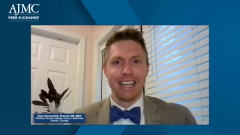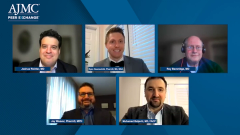
Incorporating RWE Into Future Decision-Making
Our panel concludes with their plans to incorporate RWE into MM management in the future.
Episodes in this series

Ryan Haumschild, PharmD, MS, MBA: Thank you all for this rich and informative discussion. I’d like to get final thoughts from each of you. Muhamed, what’s your final thought for this group?
Muhamed Baljević, MD, FACP: We live in incredibly exciting times. We’re learning rapidly. We’re in a position to meaningfully impact people’s lives for long durations of time. We have to increasingly incorporate patients and other decision makers. [We have to] learn from other places, like Europe—where health care is designed completely differently, with different responsibilities, health care resources, and management strategies—to try to strike the important balance of achieving long-term disease controls and survival while balancing toxicities and quality of life.
Ryan Haumschild, PharmD, MS, MBA: Roy, how about you for a final thought?
Roy Beveridge, MD: The war on cancer has been remarkably successful since President [Richard] Nixon [signed the National Cancer Act in 1972]. Myeloma is a great example. We have many effective treatments. The issue that we clinicians must deal with, as we’re working with payers and others, is how we most effectively use the resources that we have and not break the bank? We have a lot of patients with myeloma, but we have a lot of patients with low-grade lymphoma, lung cancer, and other things. As clinicians, we have to spend a little time thinking about—to Muhamed’s point, looking at how the Europeans do it—how are we going to start controlling these costs?
Ryan Haumschild, PharmD, MS, MBA: The balance of cost of care with effective treatment is such an important responsibility on all of us.
Roy Beveridge, MD: Yes.
Ryan Haumschild, PharmD, MS, MBA: As we finish, Josh, what’s 1 takeaway you want our viewership to know?
Joshua Richter, MD: I’m going to quote Jeff Goldblum from Jurassic Park. The researchers are so busy trying to figure out if they could that they never stop to think if they should. These are things that we ought to think about, and this discussion is a prime example of what it needs to be. Modern medicine is extremely siloed: this is my chart, my area, your lane. We need to have more interaction like this [discussion]. More honest interaction among pharmacy, payers, agency, and practitioners instead of huddling in our own group saying, “How can we deceive the other? How can we get 1 over on them because they don’t know what they’re talking about?” We all know what we’re talking about. We all bring something different to the table. Things like this are the way we get that answer.
Ryan Haumschild, PharmD, MS, MBA: Excellent. Jay, finish us with your final thought.
Jay Weaver, PharmD, MPH: I echo a lot of what was said. I was thinking about Muhamed’s excitement about the times we’re in. This is the confluence of not only medical technology but an era where computer technology and computer science have given us the ability to data mine and run multivariate analyses to understand the impact of these data, to see insights in a way we haven’t before. I’m excited to see the confluence of those 2 things and how that might propel us much further and faster.
Ryan Haumschild, PharmD, MS, MBA: Thank you all again, and thank you to our viewing audience. We hope you found this AJMC® Peer Exchange to be useful and informative.
This transcript has been edited for clarity.
Newsletter
Stay ahead of policy, cost, and value—subscribe to AJMC for expert insights at the intersection of clinical care and health economics.











